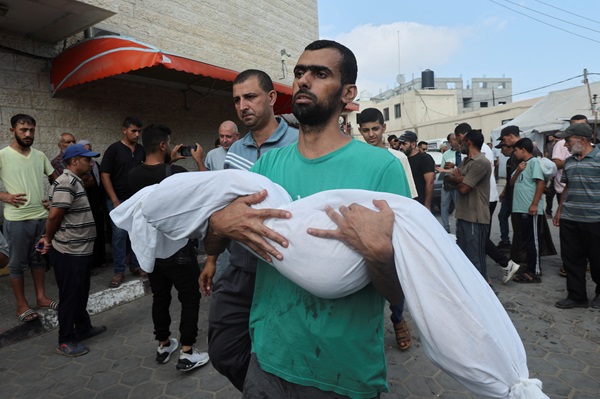 A Palestinian man carries the body of a loved one killed in Israeli strikes, amid the Israel-Hamas conflict, outside Al-Aqsa Martyrs Hospital in Deir Al-Balah in the central Gaza Strip, 16 July 2024;
Credit: Reuters/Ramadan Abed
A Palestinian man carries the body of a loved one killed in Israeli strikes, amid the Israel-Hamas conflict, outside Al-Aqsa Martyrs Hospital in Deir Al-Balah in the central Gaza Strip, 16 July 2024;
Credit: Reuters/Ramadan Abed
CAIRO/GAZA (Reuters) - Israeli forces battled Hamas-led fighters in several parts of the Gaza Strip on Tuesday 16 July 2024, and Palestinian health officials said at least 57 people were killed in Israeli bombardments of southern and central areas.
The Palestinian Islamist militant group Hamas has accused Israel of stepping up attacks in Gaza to try to derail efforts by Arab mediators and the United States to reach a ceasefire deal. Israel says it is trying to root out Hamas fighters.
In Rafah, a southern border city where Israeli forces have been operating since May, five Palestinians were killed in an airstrike on a house, Gaza health officials said. In nearby Khan Younis, a man, his wife and two children were killed, they said.
Later on Tuesday, an Israeli airstrike on a car killed at least seventeen Palestinians and wounded 26 others in Khan Younis in southern Gaza, the officials said.
The airstrike hit near a tented area housing displaced families in Attar Street in the humanitarian-designated area of Al-Mawasi, the health ministry said.
The Israeli military said the strike targeted a senior militant of the Islamic Jihad group, an ally of Hamas.
"We are looking into the reports stating that several civilians were injured as a result of the strike," the military statement said.
Reuters footage showed residents carrying bodies of the dead and wounded on donkey carts and in rickshaws to hospitals.
"The car was targeted, the blood was splashing, and shrapnel hit our tents and martyrs were left on the street. We screamed: ‘We need an ambulance'. We put [the casualties] on carts and rickshaws and the ambulance came after a while,” said eyewitness Tahrir Matir, who lives in a tent nearby.
UN school also hit
In the historic Nuseirat camp in central Gaza, at least four Palestinians were killed in separate shelling and aerial strikes in central Gaza, medics said. An Israeli airstrike also killed four in Sheikh Zayed in northern Gaza, they said.
Hours later, an Israeli air strike on a UN-run school that housed displaced families in the Nuseirat camp killed 23 people and wounded many others, health officials said.
Among those killed was local journalist Mohammad Meshmesh, taking the number of journalists killed in the conflict to 160, the Hamas-run Gaza government media office said.
"Where is the safety for [UN] agency schools? There are no more safe agency schools, or safe clinics, no more safe houses, no safe streets. We have been left desolate, displaced and destroyed," said eyewitness Umm Omar Ahmed at Nuseirat camp.
The Israeli military said in a statement it had attacked a group of "terrorists" who had operated from inside the school, after taking steps to mitigate the risk to civilians.
Israel vowed to eradicate Hamas after its militants killed 1,200 people and took over 250 hostages in an attack on southern Israeli communities on 7 October, according to Israeli tallies.
On Tuesday, the military said it had eliminated half of the leadership of Hamas' military wing, with about 14,000 fighters killed or captured since the start of the war.
At least 38,713 Palestinians have been killed in Israel's retaliatory offensive since then, Gaza health authorities said in their latest update on Tuesday. Israel also says 326 of its soldiers have been killed in Gaza.
Relatives visited Al-Aqsa Hospital in Deir Al-Balah in central Gaza to say farewell to relatives before funerals.
"We’re exhausted...we are extremely tired, our patience is over," said elderly Palestinian Sahar Abu Emeira. "Whether Hamas or the others [Israel] they need to agree as soon as possible."
Talks paused
Efforts to end the conflict stalled on Saturday after three days of negotiations failed to produce a viable outcome, Egyptian security sources said, and after an Israeli strike targeting Hamas' top military chief, Mohammed Deif.
That attack killed more than 90 people in the Khan Younis area, according to Gaza health authorities.
A Palestinian official close to the negotiations told Reuters Hamas was keen not to be seen as halting the talks despite the stepped-up Israeli attacks.
"Hamas wants the war to end, not at any price. It says it has shown the flexibility needed and is pushing the mediators to get Israel to reciprocate," the official said.
He said Hamas believed Israeli Prime Minister Benjamin Netanyahu was trying to avoid a deal by adding more conditions that restrict the return of displaced people to northern Gaza and to keep control over the Rafah border crossing with Egypt.
US State Department spokesperson Matthew Miller said on Monday 15 July 2024 that two senior advisers to Netanyahu had said Israel was still committed to reaching a ceasefire.








